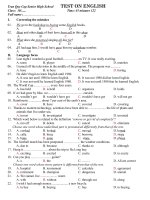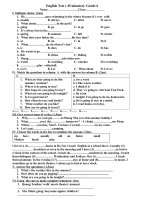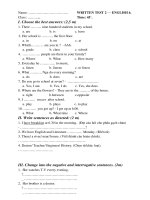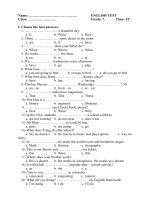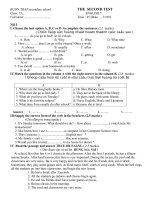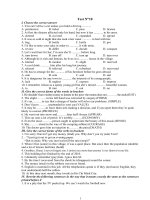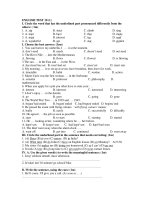ENGLISH TEST 10 (2) pptx
Bạn đang xem bản rút gọn của tài liệu. Xem và tải ngay bản đầy đủ của tài liệu tại đây (28.69 KB, 6 trang )
ENGLISH TEST 10 (2)
I. Circle the word that has the underlined part pronounced differently from the others:
( 1m)
1. a. bought b. brought c.though d. thought
2. a. blue b. sugar c. could d. woman
3. a. talk b. ball c. walking d. got
4. a. future b. early c. burn d.
excursion
II. Choose the best answer: (3ms)
1. My uncle is a . . . He often does research in his laboratory.
a. science b. sciences c. scientist d.
scientists
2. My uncle John . . . manager of the firm.
a. has just made b. has just been made c. has just been making d. is just
made
3. He invented a new kind of wheelchair for the . . .
a. unhappy b. rich c. unemployed d. disabled
4. There are a lot of regional . . . in England.
a. different b. differently c. differences d. differs
5. It’s the largest ship I . . .
a. have ever seen b. see c. saw d. had ever
seen
6. Gold . . . near San Francisco in 1848, and the gold rush started the following year.
a. discovered b. was discovered c. has been discovering d. is
discovering
7. The boy . . . is standing over there is my son.
a. which b. whom c. whose d. who
8. Jim passed his driving test, . . . surprised everybody.
a. who b. which c. whom d. that
9. I . . . a friend at six.
a. meet b. met c. am meeting d. will
have met
10. Tom, . . . had been driving all day, was tired.
a. which b. who c. whom d. that
11. I can’t meet you tomorrow because my parents . . . to see me.
a. are coming b. come c. will come d. all are
correct
12. This is the first time I . . . that play.
a. have ever seen b. saw c. am seeing d. have
seen
III. Circle the underlined part in the sentence that needs correcting: (1m)
1. I (A) used to (B) getting up (C) late (D) when I was small.
2. Billy (A) has called his lawyer last night (B) to tell him about his problems, but he (C) was
told that the lawyer (D) had gone to a lecture.
3. (A) The government (B) is doing something (C) to help (D) the poor people.
4. Ho Chi Minh City, (A) which it has the (B) biggest population, is also the (C) largest city
in (D) my country.
IV. Read the passage to find the information. Write it in the blanks: (2ms)
The computer, the marvel of the machine age, has been in use since 1964. A computer can do
simple computations- add , subtract, multiply, and divide- with lightning speed and perfect
accuracy.
Once it is given a “program” – that is, a carefully worked- out set of instructions devised by a
technician trained in computer language – a computer can gather a wide range of information
for many purposes.
At times computers seem almost human. They can “read” handprinted letters, play chess,
compose music, write plays, and even design other computers. Is it any wonder that they are
sometimes called “thinking” machine?
Even though they are taking over some of the taks that were once accomplished by our own
brains, computers are not replacing us – at least not yet. Our brain has more than 10 billion
cells. A computer has only a few hundred thousand parts. For some time to come, then, we
can safely say that our brains are at least 10,000 times more complex than a computer. How
we use them is for us, not the computer, to decide.
1. Artificial intelligence or the . . . has been in use since 1946.
2. A computer can do . . . – add, subtract, multiply, and divide with lightning speed
and perfect accuracy.
3. A computer can gather a wide range of . . . for many purposes.
4. At times, computers seem almost . . . because they can read handprinted letters,
play chess, compose music, write plays and even design other computers.
5. Computers are sometimes called . . . machines.
6. Our . . . has more than 10 billion cells.
7. A computer has only a few hundred thousand . . .
8. Our brains are more . . . than a computer.
V. Write the sentence so that it has the same meaning: (3ms)
1. They have just stolen his car.
His car . . ………………………….
2. The last time I played tennis was 2002.
I haven’t . . .
3. When he was young, he usually did morning exercise in the park.
He used . . . …………………….
4. He arrived on time. It surprised everybody.
He arrived on time . …………………………. everybody.
5. I haven’t seen that man here before.
It’s the first time . . ………………………………
6. The girl is sitting here. She’s my sister- in- law.
The girl . . . ., . . . . . . . . . . . .
15-MINUTE ENGLISH TEST 10 (2)
I. Circle the word that has the underlined part pronounced diferently from the
others:
1. what call got doctor
2. all sport stop ball
3. bore more bought wrong
II. Grammar and vocabulary:* Circle the best answer:
1. The brothers ( differs/ differ/ different/ difference) widely in their tastes.
2. It’s only fair that the ( poor/ rich/ blind/ dead) should pay higher taxes than the
( poor/ rich/ blind/ dead).
3. Last night we ( used to go/ had gone/ go/ went) to the cinema.
4. She ( lived/ had lived/ used to live/ has lived) in Sydney, but now she lives in
Melbourne.
* Combine the two sentences using the suitable Relative Pronoun:
1.He wanted me to come at 2p.m This didn’t suit me at all.
2. She tore up my photo. This upset me.
3. The man is very friendly. He lives next door.
PRESENT SIMPLE/ PRESENT CONTINUOS
1. This food (is smelling/ smells) delicious.
2. He (is going / goes) to the gym every week.
3. Right now Tony (is washing/ washes) his car.
4. Laurie always (goes/ is going) to work at seven.
5. We (go/ are going) to the movie at six tonight.
6. He usually (phones/ is phoning) in the evening.
7. It may sound strange but I (believe/ am believing) his story.
8. I (remember/ am remembering) my first day at school.
SIMPLE PAST/ PAST CONTINUOS
1. At 3 o’clock in the morning Mary (was reading/ read).
2. I (was calling/ called) Linda at 10 last night.
3. While I (watched/ was watching) T.V. I heard a strange noise.
4. When Bob (arrived/ was arriving) everyone was eating.
5. While I was studying, my roommate (listened/ was listening) to the radio.
6. Jerry (was buying/ bought) a new car last month.
7. When I heard the knock on the door, I (opened/ was opening) it.
8. He (went/ was going) to the library when he suddenly saw her pass by.
Change to the third person:
‘My name’s Roberta. I’m a nurse. I work in a hospital in Boston. I don’t live in Boston. I
live outside it. I drive to work. I’m single and I have a boyfriend. My boyfriend’s name’s
Alex. We are both 24.’
Complete with one word in each space:
My brother’s name - - - Eduardo. He’s 28 and he - - - in Madrid with - - - wife,
Lourdes, and - - - daughter Laura. Eduardo - - - in a bank in Madrid. Lourdes - - -
a journalist. They - - - have much free time. They - - - five days a week. On
Saturdays Eduardo - - - shopping and Lourdes - - - after Laura. On Sundays - - -
they normally visit Laura’s grandmother. In the evening Eduardo - - - the football on
TV and Lourdes - - - the newspaper. In summer they usually - - - to Portugal for
their holidays. But last summer they - - - to Morocco.
Each sentence has a mistake. Find it and correct it:
1. London is a city very big.
2. My mother works in a hotel is a receptionist.
3. My father watch TV in the evening.
4. He’s like watching football.
5. On Sundays we go in a restaurant.
6. Han is bussinessman.
7. You family is very nice.
8. I like listen to music.
9. Our school have a lot of students.
10. The childrens go to school near here.
11. We have the dinner at seven.
12. Buses in London are reds.
13. My brother no have a job.
14. Do you want a ice-cream?
15. Is near here my flat.
16. My brother go to university.
17. English is a language international.
18. I don’t like swim.
19. I arrive at Heathrow airport at ten o’clock last night.
20. She could to speak three languages when she was ten.
21. Where did you went last night?
22. I saw the wife of Jeremy at the shop.
23. I don’t can go out because I have a lot of homework.
24. In the kitchen is a table.
25. I was to the cinema last weekend.
26. My children like they’re school very much.
27. I buy a new video.
28. Did you watch the football on TV last evening?
29. Italian people is very artistic.
30. I like cities because I can go to the theatre.
31. It’s very hot today- do you like something to drink?
32. Peter’s got a lot of books because he’d like reading.
33. How many children do you got?
34. How many money has he got?
35. Who’s is that new car?
36. I’m go home now because it’s late.
37. Last night I went to a café for to meet my friends.
38. We’re going have a test next week.
39. I’m wear old clothes because I’m going to clean the car.
40. Peter is French, he’s coming from Paris.
41. What you doing tonight?
42. My sister is more old than me?
43. I think is going to rain.
44. Your house is bigger than my.
45. Who is the most rich person in the world?
SEMESTER I – ENGLISH 10
II. Put each verb in brackets in the correct tense: (1.5ms)
1. Ann lives in London but her brother John 1.(live) ______________ in Paris.
He 2.(arrive) ______________ yesterday to visit her. She loves her brother and is
happy to be with him. Tomorrow she 3.(take) ______________ him to some
interesting places in London.
2. A. 1.(you, see) _____________________ this film?
B. Yes, I have.
A. When 2.(you, see) _____________________ it?
B. I 3.(see) _______________________ it last week.
III. Give the correct form of the word in brackets: (1.5ms)
1. Their children are fond of (read) _______________ picture books.
2. He is (interest) ________________ in English.
3. The old lady never has any (visit) __________________ .
4. The book was (write) ________________ by a famous author.
5. You look more (beauty) ________________ in your new dress.
6. Some children are (mental) ___________________ retarded.
IV. In each of the following sentence, there is one mistake. Find it and correct it.
Write the answer in the blank. See the example: (1.5ms)
EX: When I’m tired, I like watch TV.
I like to watch
1. They were hungry, so she suggested to have dinner early.
2. They are collecting money for poor and needy.
I can’t find my dictionary, that is a real nuisance.
4. They used go to the theatre when they lived in Paris.
5. When you want to go to the cinema tonight, I’ll go with you.
6. The man which came with Jane is her husband.
V. Finish each of the following sentences in such a way that it is as similar as
possible in meaning to the original sentence: (2ms)
1. Julia started working for this company 6 years ago .
Julia for 6 years.
2. No one has done this job.
This job . . .
3. Although they were old, they worked very hard.
They worked very hard in spite of . . .
4. “I don’t have many friends,” Tom said to Ann.
Tom told . . .
Dear Mom,
This is just a quick note to tell you how the holiday is going. We’re staying in a nice hotel
in a quiet part of town, so you can imagine how we feel. As you know, this is a small
city, and the people are very kind and friendly. We have had some good weather since we
got here, so we are feeling very happy. We have seen some of the beautiful sights and a
few museums, and we thought they were very impressive. Yesterday we decided to go for
a swim, and we went to a nice beach where the water was blue and clean.
Last night we had a delicious meal in a wonderful restaurant. The food and services were
excellent. When the bill came, we could hardly believe it, as it was so cheap.
As our hobbies are sightseeing and swimming, we enjoyed the holiday so much.
Anyway, I’d better stop, but I’ll write again soon.
Love,
Mary & John
1. Where/ Mary and John/ staying?
2. What/ people in the city/ like?
3. weather/ been/ very bad/ there?
4. Where/ Mary and John/ go for a swim?
5. they/ pay a lot/ their delicious meal?
